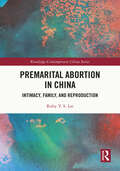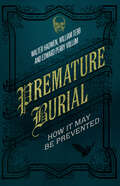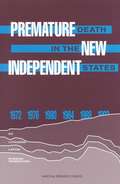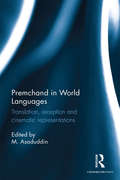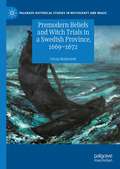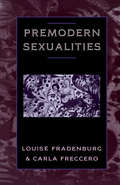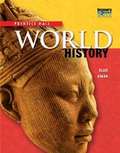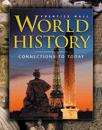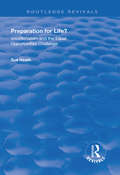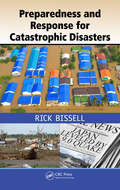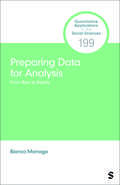- Table View
- List View
Premarital Abortion in China: Intimacy, Family and Reproduction (Routledge Contemporary China Series)
by Ruby Y.S. LaiDrawing on participant observations, in-depth interviews, and content analysis of online materials, Lai investigates the role of individual choice, relationships, and institutions in unmarried Chinese women’s decisions to terminate their pregnancies. Where many previous studies have focused on abortion in China as a state-mandated procedure to enforce the one-child policy, Lai looks at a new era, where abortion is primarily based on individuals’ decisions. While young women in China enjoy greater freedom to pursue their personal, sexual, and reproductive aspirations, their autonomy remains constrained by structural inequalities of gender, class, and migration status, which are reproduced through the intersection of state policies, market forces, and patriarchal family culture. In this book, Lai recounts the stories and presents the voices of unmarried young adult women, and documents the impact of sweeping socioeconomic transformation on their reproductive experiences in contemporary China amidst the ending of the one-child policy. Essential reading for scholars of Chinese society and of family and gender studies globally.
Premature Burial: How It May Be Prevented
by Walter Hadwen Walter R. HadwenLong out of print, this book was written by a prominent physician to reassure the many 19th century people who were worried about being buried aliveOne of the authors himself had a narrow escape with live burial, as his collaborator writes: "Dr. Vollum first became interested in the important question of Premature Burial in consequence of his own very narrow escape from live sepulture, having been pronounced dead from drowning, and prepared, for interment, when consciousness happily returned spontaneously." This edited version of the book extracts the most spine-chilling stories of narrow escapes and living burials from a mass of historical material. It includes such chapters as Animal and So-called Human Hibernation, Narrow Escapes from Premature Burial, Premature Burial of Doubtful Cases, Death-Counterfeits, The Danger of Hasty Burials, Sudden Death, Embalming and Dissections, and Count Karnice-Karnicki's Invention.
Premature Death in the New Independent States
by Committee on PopulationIn recent years there have been alarming reports of rapid decreases in life expectancy in the New Independent States (former members of the Soviet Union). To help assess priorities for health policy, the Committee on Population organized two workshops--the first on adult mortality and disability, the second on adult health priorities and policies. Participants included demographers, epidemiologists, public health specialists, economists, and policymakers from the NIS countries, the United States, and Western Europe. This volume consists of selected papers presented at the workshops. They assess the reliability of data on mortality, morbidity, and disability; analyze regional patterns and trends in mortality rates and causes of death; review evidence about major determinants of adult mortality; and discuss implications for health policy.
Premchand in World Languages: Translation, reception and cinematic representations
by M. AsaduddinThis volume explores the reception of Premchand’s works and his influence in the perception of India among Western cultures, especially Russian, German, French, Spanish and English. The essays in the collection also take a critical look at multiple translations of the same work (and examine how each new translation expands the work’s textuality and annexes new readership for the author) as well as representations of celluloid adaptations of Premchand’s works. An important intervention in the field of translation studies, this book will interest scholars and researchers of comparative literature, cultural studies and film studies.
Premodern Beliefs and Witch Trials in a Swedish Province, 1669-1672 (Palgrave Historical Studies in Witchcraft and Magic)
by Göran MalmstedtThis book examines the worldview and perceptions of reality that formed the setting for the witch trials held in the Swedish province of Bohuslän in 1669-1672. The first part of the book explores the conduct of the trials and provides, among other things, an analysis of the defendants and of the various accusations from neighbours and the court. The following parts analyse the perceptions of reality found in the statements made in court by witnesses and the accused. The topics addressed include the relationship between dreams and reality, belief in shape-shifting, the power of words, emotions, and magically charged matters, as well as perceptions of God and the Devil. The beliefs that surfaced during the trials were part of a general mentality that characterised people’s perception of the world, both before and after the trials. As the records from the prolonged cross-examinations of the accused are unusually detailed, the defendant’s statements, together with accusations, testimonies, and the courts’ questions, provides a unique insight into premodern worldviews.
Premodern Sexualities
by Carla Freccero Louise FradenburgPremodern Sexualities offers rigorous new approaches to current problems in the historiography of sexuality. From queer readings of early modern medical texts to transcribing and interrogating premodern documents of sexual transgression, the contributors bring together current theoretical discourses on sexuality while emphasizing problems in the historicist interpretation of early textualizations of sexuality. Premodern Sexualities clarifies the contributions literary studies can make--through its emphasis on reading strategies--to the historiography of sexuality.
Prentice Hall America History of Our Nation Beginnings Through 1877
by James West DavidsonNIMAC-sourced textbook
Prentice Hall Brief Review Global History and Geography (New York Edition)
by Steven Goldberg Judith Clark DupréExam Prep for Global History and Geography for New York High School Students
Prentice Hall United States History
by Alan Taylor Randy Roberts Peter B. Levy Emma J. Lapsansky-WernerNIMAC-sourced textbook
Prentice Hall United States History: Reconstruction to the Present (Ohio)
by Alan Taylor Randy Roberts Peter B. Levy Emma J. Lapsansky-WernerNIMAC-sourced textbook
Prentice Hall World History
by Elisabeth Gaynor Ellis Anthony EslerGrades 9-12. Textbook includes history from the beginning of civilization to the present.
Prentice Hall World History Michigan
by Elisabeth Gaynor Ellis Anthony EslerWorld History-Michigan edition
Prentice Hall World History Tennessee
by Elisabeth Gaynor Ellis Anthony EslerNIMAC-sourced textbook
Prentice Hall World History The Modern Era
by Elisabeth Gaynor Ellis Anthony EslerNIMAC-sourced textbook
Prentice Hall World History: Connections to Today
by Elisabeth Gaynor Ellis Anthony Esler Burton F. BeersYou can use this book as a tool to master world history. Spend a few minutes to become familiar with the structure of the book and see how you can unlock the secrets of world history.
Prentice Hall World Studies: Eastern Hemisphere
by Prentice Hall StaffSocial Studies textbook for middle school students
Prentice Hall World Studies: Eastern Hemisphere
by Prentice Hall StaffSocial Studies textbook for middle school students
Prentice Hall, World Geography, Building a Global Perspective
by Celeste Fraser Thomas J. BaerwaldNIMAC-sourced textbook
Preparation for Life?: Vocationalism and the Equal Opportunities Challenge (Routledge Revivals)
by Sue HeathFirst published in 1997, this volume contributes to the debate on the ground-breaking Technical and Vocational Education Initiative (TVEI) introduced by Margaret Thatcher by exploring the implications of its equal opportunities policy. The scheme was announced in 1982, piloted in 1983, extended nationally in 1987 and ended in 1997. It responded to criticisms that the education system was failing to meet the needs of employers and committed to equal opportunities for boys and girls along with increasing access to technology at the genesis of the computing era. The TVEI represented the first major intervention by central Government in curriculum development in England and was organised on a local authority level. The author, Sue Heath, had experienced mixed messages for what students of each gender could expect to achieve and she remained fascinated by the implications of the TVEI for 1980s school curriculums. Based on research begun in 1989, the volume reassesses the significance of the TEVI as a landmark policy in education. Heath examines areas including vocationalism, the issue of gender, implementing the TVEI locally, the curricular experiences of TVEI pupils and whether the TVEI succeeded in preparing students for the world of work and later life.
Preparedness and Response for Catastrophic Disasters
by Rick BissellBased on a popular course for the FEMA Higher Education project, Preparedness and Response for Catastrophic Disasters provides important insight into plans to mitigate and respond to the devastation caused by large-scale catastrophic events. Hurricane Katrina provided clear evidence that these occurrences are both qualitatively and quantitatively d
Preparing Data for Analysis: From Raw to Ready (Quantitative Applications in the Social Sciences)
by Bianca ManagoThis book focuses on the process of preparing raw data for analysis—commonly known as data cleaning. It covers a range of topics including data compilation, variable naming and labeling, data examination, and variable re-coding and transformations, among others. Author Bianca Manago discusses best practices for data preparation and analysis, emphasizing the importance of prioritizing transparency, best practices for writing script files, and file naming and organization. Two example projects and datasets are used to illustrate the methods in the book, and the datasets, script files, and output files in both R and Stata are available to download at https://github.com/biancamanago/DataPreparation_QASS2025.
Preparing Data for Analysis: From Raw to Ready (Quantitative Applications in the Social Sciences)
by Bianca ManagoThis book focuses on the process of preparing raw data for analysis—commonly known as data cleaning. It covers a range of topics including data compilation, variable naming and labeling, data examination, and variable re-coding and transformations, among others. Author Bianca Manago discusses best practices for data preparation and analysis, emphasizing the importance of prioritizing transparency, best practices for writing script files, and file naming and organization. Two example projects and datasets are used to illustrate the methods in the book, and the datasets, script files, and output files in both R and Stata are available to download at https://github.com/biancamanago/DataPreparation_QASS2025.
